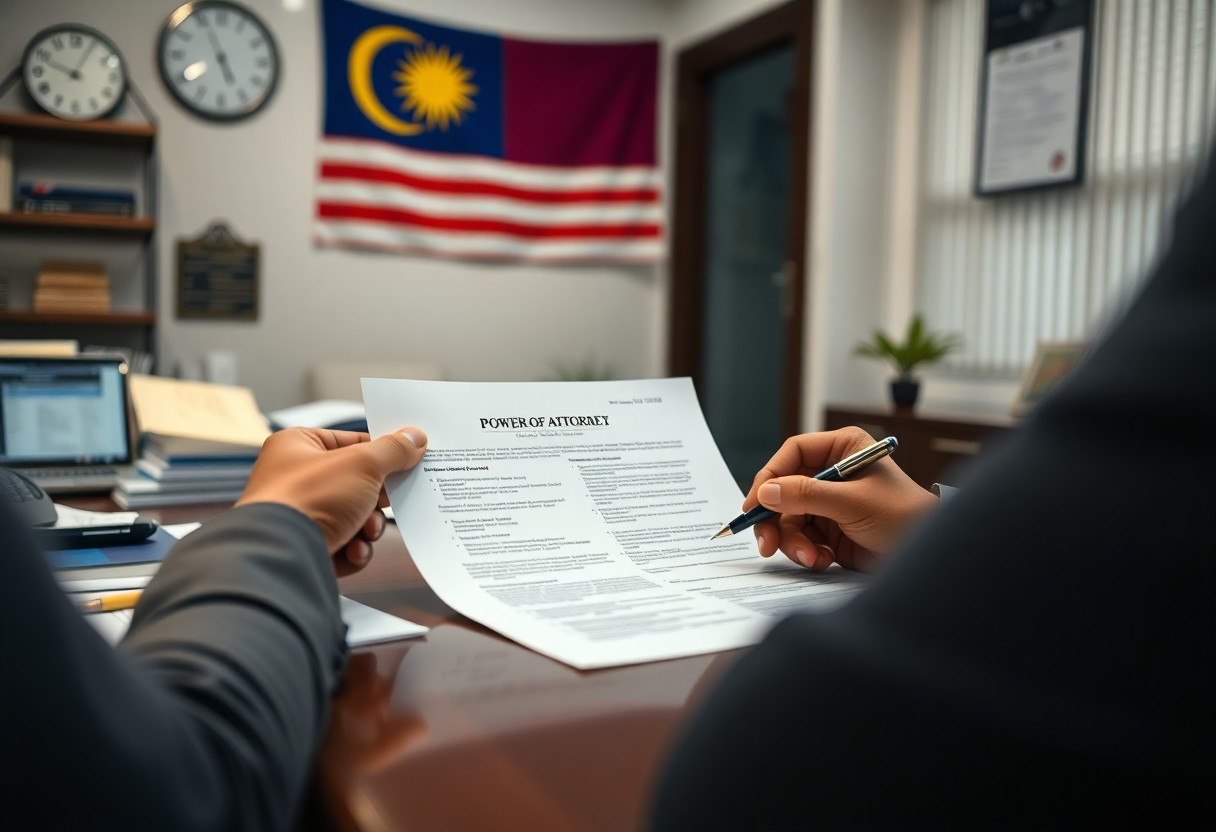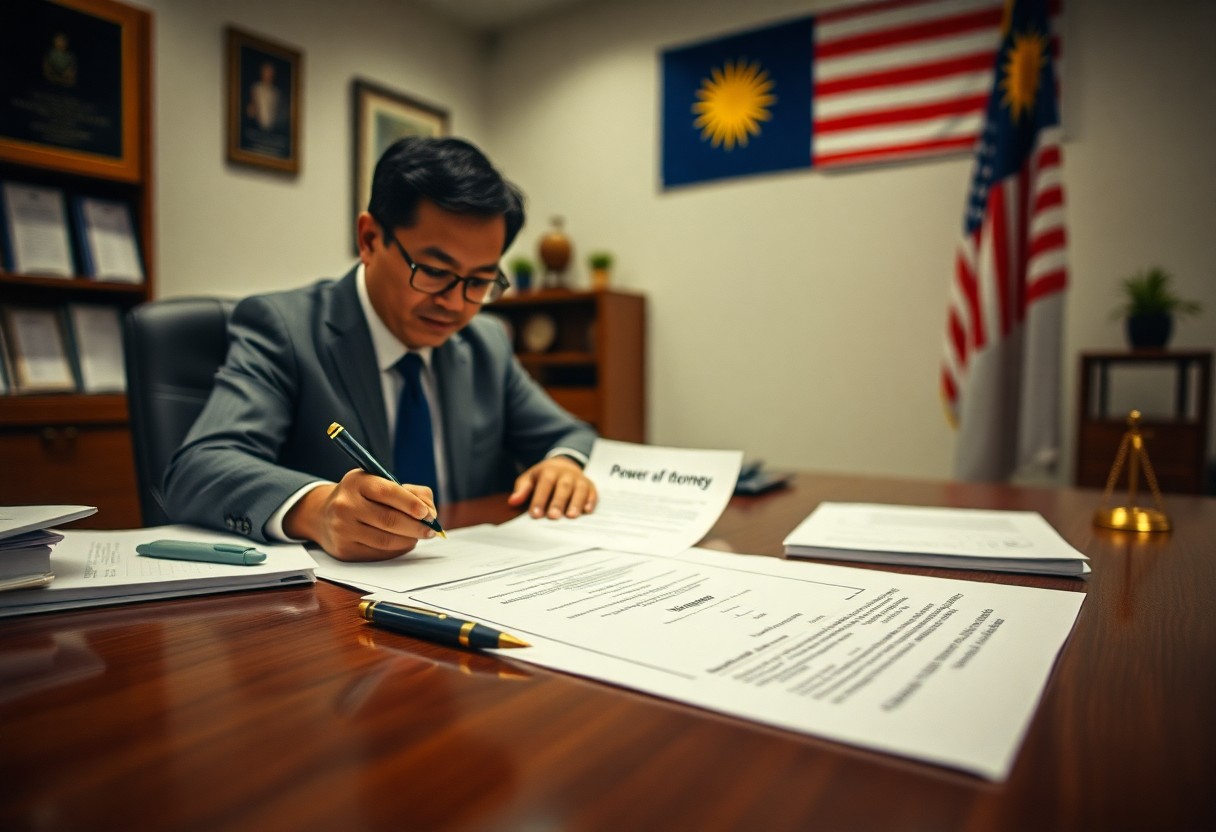There’s a straightforward way for you to grant someone authority to manage your affairs by registering a Power of Attorney (POA)

Key Takeaways:
- Identify the types of power of attorney available in Malaysia: Ordinary Power of Attorney and Lasting Power of Attorney.
- Gather necessary documents, including identification and proof of the relationship between the parties involved.
- Ensure that the principal (the person granting the power) is of sound mind and voluntarily signing the document.
- Have the power of attorney document drafted, either through a lawyer or using a standard form, ensuring it meets legal requirements.
- Sign the document in the presence of a witness, who must also sign it, to validate the agreement.
- Register the power of attorney with the Land Office or relevant authority if it pertains to property transactions.
- Keep copies of the registered document and inform the attorney-in-fact (the person receiving the power) about the arrangement.
Understanding Power of Attorney in Malaysia
Your understanding of Power of Attorney (POA) is crucial when considering this legal tool in Malaysia. A POA allows you to delegate decision-making authority to another person, enabling them to act on your behalf in various legal and financial matters. This can be particularly important when you are unable to manage your affairs due to absence, illness, or incapacity.
Definition and Purpose
Even though the concept may seem straightforward, the definition of Power of Attorney encompasses a wide range of legal authority. The main purpose of a POA is to provide you with the ability to authorize someone you trust to handle your affairs, whether for financial, medical, or other important decisions. This ensures your interests are protected when you cannot act independently.
Types of Power of Attorney
Types of Power of Attorney vary in their scope and application. Common types include:
- General Power of Attorney: Grants broad powers to manage your affairs.
- Specific Power of Attorney: Limits the agent’s authority to specific tasks.
- Durable Power of Attorney: Remains effective even if you become incapacitated.
- Springing Power of Attorney: Activates under specific conditions, such as incapacitation.
- Medical Power of Attorney: Empowers someone to make healthcare decisions on your behalf.
Thou can choose the type that aligns with your needs.
| Type of POA | Description |
|---|---|
| General POA | Authorizes broad powers. |
| Specific POA | Grants limited authority. |
| Durable POA | Effective during incapacity. |
| Springing POA | Activates under certain conditions. |
| Medical POA | Manages healthcare decisions. |
Malaysia encompasses multiple facets when it comes to Power of Attorney. Each type offers unique advantages that cater to your individual circumstances. Carefully assessing your needs is vital before proceeding with the creation of a POA.
- General POA: Broad authority granted.
- Specific POA: Limited to certain activities.
- Durable POA: Lasts through incapacity.
- Springing POA: Needs specific conditions.
- Medical POA: For health-related decisions.
Thou should explore these options thoroughly before establishing a Power of Attorney in Malaysia.

Steps to Register a Power of Attorney
Now, registering a Power of Attorney in Malaysia involves several key steps. You’ll need to gather the necessary documents, fill out the required forms, and submit your application to the relevant authorities. Each step must be completed carefully to ensure your Power of Attorney is legally valid and recognized. Following these steps will help you navigate the process smoothly and efficiently.
Preparing Required Documents
Preparing the necessary documents is imperative for a successful registration. You will need to gather your identification proof, details of the appointed attorney, and relevant property or asset documentation. Make sure all documents are notarized where required, as this adds legitimacy and strength to your application.
Applying at Relevant Authorities
Steps to apply at the relevant authorities include submitting your documents to the Commissioner for Oaths or a designated registration office. You should also ensure that you accurately complete all forms to avoid delays in processing.
Relevant authorities will review your application to ensure it meets all legal requirements. This process may involve a brief interview, where you can clarify your intentions and any questions regarding your Power of Attorney. Failure to provide accurate information or necessary documents can halt your application. Once approved, you will receive a certified copy, granting your attorney the authority to act on your behalf, greatly enhancing your legal standing.
Tips for a Successful Registration
Keep the following tips in mind for a successful Power of Attorney registration:
- Consult with a legal expert to understand your legal rights.
- Collect all required documentation before you begin.
- Ensure the principal’s and agent’s identities are clearly verified.
- Follow the correct procedures for witnessing and signing.
- Be aware of any local regulations that may apply.
Knowing these tips will help streamline the process and minimize potential issues.
Common Mistakes to Avoid
To ensure a smooth registration, avoid common mistakes such as not having the documents properly witnessed, failing to specify the powers granted, or neglecting to keep copies of the registered document. Double-check all details and engage a professional if uncertain.
Ensuring Compliance with Legal Requirements
Ensuring your Power of Attorney complies with legal requirements is vital to its effectiveness.
It is imperative to understand the specific legal criteria in Malaysia, which may include the correct completion of the document, proper witnessing by authorized individuals, and registration at the relevant authority. Failing to comply with these requirements can lead to your Power of Attorney being deemed invalid, which can have severe repercussions for both you and your legal representative. Always verify that every aspect of the registration aligns with Malaysian laws to protect your rights and authority effectively.
Factors to Consider Before Granting Power of Attorney
Despite the importance of granting a Power of Attorney, it is necessary to evaluate several factors before making your decision. Consider the following:
- Your trust level in the person you choose
- The scope of authority you are comfortable granting
- Your specific needs and situation
For more details, check out What Is The Process Of Naming Someone Your Power . . .. Knowing these factors will help you make an informed choice.
Choosing the Right Attorney-in-Fact
The selection of your Attorney-in-Fact is a significant decision. Ensure you choose someone who is trustworthy, capable, and understands your wishes. The person should ideally have experience managing the responsibilities associated with your power of attorney.
Duration and Scope of Authority
You must clearly define the duration and scope of authority granted to your Attorney-in-Fact. This will help prevent misunderstandings and ensure that your attorney can act within the limits you set.
Power of Attorney can last for a specific period or until revoked, which may depend on your particular needs. You should detail the powers you are granting, from managing finances to making healthcare decisions. This specificity protects you and limits any potential misuse of authority. Be conscious that an overreaching or undefined scope can lead to misuse, causing *severe consequences*. Maintaining clarity prevents risks and ensures your interests remain safeguarded.
Revoking a Power of Attorney
For individuals looking to revoke a Power of Attorney (POA), it is crucial to follow the proper legal procedures to ensure your intention is recognized. Revocation provides you with the ability to regain control over decision-making powers that you had previously delegated. It’s advisable to express your decision in writing and notify the appointed agent and relevant parties promptly.
Process for Revocation
Now, to initiate the revocation process, you will need to draft a formal revocation notice, clearly stating your intention to cancel the existing POA. It is recommended to have this document signed in the presence of a witness or a notary public for authenticity. Once prepared, give copies to the person who held the POA and any institutions that were relying on it.
Legal Implications
With revoking your Power of Attorney, you must be aware of the potential legal ramifications. You need to ensure you correctly follow the revocation process to avoid any disputes or misunderstanding that could arise. If your previous agent has already taken actions on your behalf while the POA was still valid, you may face complications that require legal guidance.
It is important to understand that revoking a Power of Attorney does not absolve you of any actions taken by your agent prior to revocation. Furthermore, if the revocation is not communicated effectively or is disputed, it may result in legal challenges or possible financial implications. Therefore, keeping thorough records and maintaining open communication with all parties involved is crucial to ensure your decisions are implemented without issue. Always consider seeking legal advice when navigating this process to protect your rights effectively.

Frequently Asked Questions
After exploring how to register a Power of Attorney in Malaysia, you may have some common queries. For detailed answers, check out this informative resource on Power of Attorney. Be sure to consider choices that suit your specific needs and circumstances for best results.
Costs Involved in Registration
Now, when it comes to the costs associated with registering a Power of Attorney in Malaysia, you can expect a combination of fees ranging from notary charges to government registration costs. These fees may vary based on the complexity of your document and the professional services used.
Duration of Registration Validity
An important aspect to be aware of regarding the validity of your registered Power of Attorney is that it typically remains effective until you revoke it or it becomes void due to specific circumstances such as your death. Ensuring you fully understand these parameters will help you maintain control over your affairs.
The duration of registration validity for a Power of Attorney is generally indefinite, remaining in effect until it is revoked or until your death. However, should you seek to limit the duration for specific tasks or time frames, you can clearly specify this within the document. It’s always advisable to review and, if needed, update the document regularly to ensure it reflects your current wishes and circumstances. Your peace of mind is important, so take the necessary steps to keep your Power of Attorney relevant and effective.
Summing up
The process of registering a Power of Attorney in Malaysia involves drafting the document, ensuring it meets specific legal requirements, and registering it with the relevant authorities. You must include crucial details about your attorney-in-fact and your intentions. Once completed, submitting the notarized document to the land office or relevant entities ensures its legitimacy. By taking these steps, you authorize someone to act on your behalf efficiently and securely.
FAQ
Q: What is a Power of Attorney (POA)?
A: A Power of Attorney is a legal document that allows an individual (the principal) to appoint another person (the attorney-in-fact or agent) to make decisions on their behalf. This can include financial, legal, or health-related decisions, depending on the scope of the authority granted.
Q: Are there specific types of Power of Attorney in Malaysia?
A: Yes, there are several types of Power of Attorney in Malaysia, including General Power of Attorney, which grants broad powers, and Specific Power of Attorney, which is limited to specific tasks or decisions. There is also a Durable Power of Attorney that remains effective even if the principal becomes incapacitated.
Q: What documents are needed to register a Power of Attorney in Malaysia?
A: To register a Power of Attorney, you typically need the signed POA document itself, identification documents of both the principal and the attorney-in-fact (such as NRIC or passports), and any additional documents that may be required depending on the specific authority being granted.
Q: Where should I register a Power of Attorney in Malaysia?
A: A Power of Attorney can be registered at the Land Office or Registry of Title if it involves property transactions. For other matters, it can be lodged with the High Court or a Notary Public. It’s advisable to consult legal professionals to determine the appropriate venue.
Q: What is the process to register a Power of Attorney in Malaysia?
A: The process generally includes drafting the Power of Attorney document, having it signed by the principal and witnessed, then submitting the signed document along with required identification to the relevant authority for registration. Fees may apply based on the scope and location of registration.
Q: Are there any fees associated with registering a Power of Attorney in Malaysia?
A: Yes, there are fees involved in registering a Power of Attorney. These fees can vary depending on the type of POA and the institution where it is registered. It’s advisable to check with the relevant authority or legal advisors for the exact fees applicable.
Q: Can I revoke a Power of Attorney in Malaysia, and if so, how?
A: Yes, a Power of Attorney can be revoked by the principal at any time as long as they are mentally competent. The revocation should be done in writing and may need to be signed and witnessed, similar to the original POA. It’s advisable to notify the attorney-in-fact and relevant authorities to ensure the revocation is recognized.
